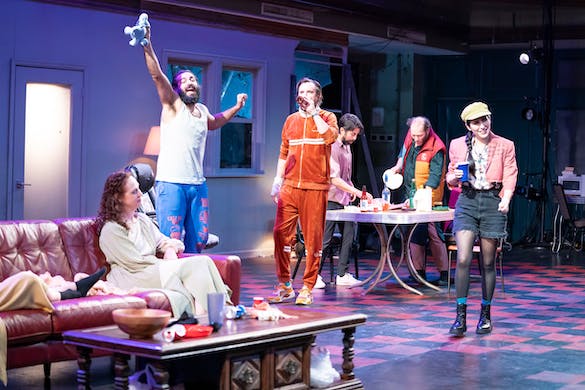At Times, Even Shakespeare and Ibsen Are Better Avoided
The new interpretations of ‘The Winter’s Tale’ and ‘Hedda Gabler’ that New York’s Bedlam is now staging in repertory are more exhausting than exhilarating.

There can be a fine line between charming and precious, or between inventive and mannered. Over the past decade, one New York-based theater company, Bedlam, has negotiated these tightropes — often skillfully — with intimate, spirited takes on works by Shakespeare, Shaw, and Jane Austen, to name a few. The aim has been to create, to quote its mission statement, “a kinetic experience of shared empathy.”
The new interpretations of “The Winter’s Tale” and “Hedda Gabler” that Bedlam is now staging in repertory certainly offer kinetic experiences, but I’m not sure that empathy is the first quality I’d use to describe what they produce. Exhaustion comes to mind, as does irritation.
Of the two productions — both helmed by Bedlam’s artistic director, Eric Tucker, who is also among the seven actors cast in either one or both plays — “Winter’s Tale” has more to recommend it. That’s despite a run time of more than three hours and a conceit that presents Shakespeare’s Bohemians, and other characters, as their modern-day counterparts, replete with costumes — by Daniele Tyler Mathews — that could have been lifted from a high school production of “Rent.”
John McDermott’s set is bookended, as it is for “Hedda Gabler,” by a sofa and a refrigerator. A dartboard also features in “Winter’s Tale,” allowing the Sicilian king, Leontes — played by Mr. Tucker — to vent his frustration when he wrongly suspects his virtuous, pregnant queen, Hermione, of dallying with his buddy, the Bohemian king, Polixenes. Plastic cups are carried and strewn about as a game of table tennis descends into violence. One partygoer vomits, repeatedly.
Things settle down a bit after intermission, as the now-grown children of Leontes and Polixenes, Perdita and Florizel — played with an easy grace by, respectively, Lisa Birnbaum and Elan Zafir, who also portray Hermione and Polixenes — form a couple, and all ends well. The final scene, in which Ms. Birnbaum is called on to suggest a statue coming to life, is appropriately romantic, lyrical, and lovely.
Granted, that’s only after the Bohemian ne’er-do-well Autolycus and the community Clown turn up as an obnoxious recording artist and a clueless promoter, requiring actors Shaun Taylor-Corbett and Mike Labbadia to dangle trite pop-culture references while confronting individual audience members. (I briefly buried my head in my notes to avoid attention.)
Bedlam’s “Hedda Gabler” would seem, at roughly two hours, to promise less of an ordeal, but it’s also shorter on redeeming features. Jon Robin Baitz’s occasionally brusque adaptation of Ibsen’s text isn’t the central problem; it’s the performances, which manage to be at once overbearing and underwhelming.
Susannah Millonzi sets the tone as the supremely dissatisfied newlywed Hedda Tesman. Ms. Millonzi is credited as choreographer of both productions, and indeed, she doesn’t so much act the part as dance it. We first see the anti-heroine sprawled almost grotesquely on a chair — foreshadowing, anyone? — and then watch as she tries to shimmy and shake her way out of the terminal boredom that oppresses her.
At one point, this Hedda appears to run through a fitness routine, first stepping on and off a chair, then jumping on the sofa before lying down for some leg lifts. Her interaction with influential interloper Judge Brack, made convincingly lecherous by Ryan Quinn, is equally physical, and creepier, with Mr. Quinn fondling and nuzzling Ms. Millonzi for several uncomfortable minutes at a time.
In Ms. Millonzi’s reading, we get little of the discretion one would expect from a character stifled by her fear of scandal. Her disdain for George Tesman, the nerdy academic whom she has unenthusiastically consented to marry, is conveyed with all the subtlety of a heart attack. Sarcasm drips from the actress’s voice, and is painted on her face like pancake makeup.
Mr. Tucker’s George, mind you, almost invites her approach; the actor, while compelling in “Winter’s Tale,” exaggerates this character’s coddled, awkward aspects to the point that Hedda’s husband comes across like a whiny teenager. Mr. Zafir is more effective as Hedda’s enduring flame, the brilliant but dissolute Eilert Lövborg, but his composure proves insufficient; at the performance I attended, the play’s wrenching climactic passage actually elicited giggles from the audience.
There’s also vomiting in “Hedda Gabler,” though less of it — perhaps in accordance with the length of the production. While I’ve been impressed enough with what I’ve seen of Bedlam’s previous work to not be queasy about checking out future efforts, I’d advise sitting these two out.

